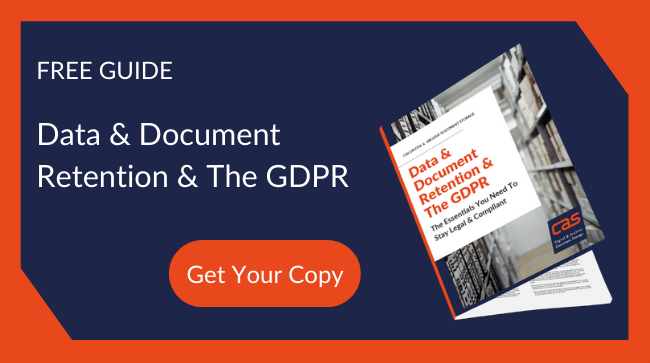For many of our clients, the task of digitising data and document archives is a daunting one; but it can be business critical. Many organisations need to do it to free up valuable office space to reduce overheads with office rents being so high. Moreover, with the advent of more flexible working practices, staff often need to be able to work remotely and share files digitally. Let CAS help you with our four-step approach in our range of digitisation services.
Step 1: Collate and Catalogue
Before we start scanning your documents, we can help you understand what needs to be digitised by cataloguing your material. Once we’ve assessed the volume and content, we can help you organise your files in a clear, systematic way. All of our document-handling staff have been approved by the Disclosure and Barring Service (DBS). So you can rest assured that you will meet your data protection requirements.
Step 2: Sort and Code
Having sorted out and clearly labelled information packets, we can then work with you to decide what to do with each one. Broadly, files fall into one of three categories:
- Immediate digitisation: documents that are actively required on a frequent basis.
- Archive storage: files which need to be retrieved only occasionally.
- Secure destruction: documents and data which are no longer required.
We’ll box up documents in date order for efficient on-demand retrieval, and we’ll individually code each file and the box in which it is stored. To make retrieval easy, efficient and accurate we use barcodes, which identify the specific records contained in that box. At CAS, you can opt for state-of-the-art Radio Frequency Identification (RFID) coding. RFID is one of the most advanced systems available. It supports strict compliance regulations (including UK and EU privacy requirements and Sarbanes-Oxley) by providing audit reports that confirm and validate the location of every RFID carton in storage. This system is available whether you store your documents on-site or off-site at one of our warehousing facilities.
Step 3: Digitising Data
The next step towards being able to access live documents digitally is for our experienced document management professional to prepare documents for scanning. This is a more complicated task than is sometimes assumed. For instance, the average medical record contains approximately 175 pages, kept together with around 40 paper clips and staples, and often including additional but crucial items such as added notes and post-its. Once preparation is complete, our document handlers scan and code the digital record, and add it to a virtual record library. They then return the original records to their storage box. We can also supply appropriate document storage boxes, which are triple-walled and tough for easy stacking and safe handling.
Step 4: Store and Digitally Retrieve
Once we’ve added scanned documents to an online document storage library, your employees can access and edit the file. It’s worth noting that, if you’re using an on-site storage solution, you’ll need to host the asset library on high-grade servers to ensure 99.999% accessibility. Ideally, too, any activity performed on a document should be recorded in an audit trail to ensure thorough compliance with document and data storage and management legislation. If you choose off-site storage with CAS, and especially if you opt for storing your digitised documents on CAS-Cloud, all of these conditions will be easily met.
Choose CAS for fully accredited services
To give you additional peace of mind that CAS will store your digitised archive safely and securely, we hold a host of key ISO accreditations:
- ISO 15489 Information and Documentation — Records Management.
- ISO 9001:2015 Quality Management.
- ISO/IEC 27001 Information Technology, Security Techniques and Information Security Management.
- ISO 14001 Environmental Management.
Next week, we’ll be exploring in more detail how important these certification systems will be under the forthcoming new data protection regime, the General Data Protection Regulation, which comes into force across Europe from May 2018.
Call one of the CAS team now if you’ve got any questions about our digitising data services or for a free, no-obligation quote. Your clients’, customers’, service users’ and employees’ digital data is always safe and secure with us, whichever of our services you choose.
For a free, no-obligation quote for 'digitising data' please contact our specialist team
- Email: Info@CAS.ltd
- Call: 0845 50 50 003
- Website
About Clarks CAS
CAS provides comprehensive and secure document digitisation, information storage and facilities management services. For more than 20 years CAS have worked with NHS Trusts, Financial Services providers, and corporate and private clients. Our head office is just four miles from the City of London, supported by our advanced storage centres across the UK. CAS has an impressive array of International certifications (ISOs), which prove our compliance with the strictest national, European and international laws. They also demonstrate our commitment to provide innovative systems on security, confidentiality and quality control in keeping your files safe and well managed.

